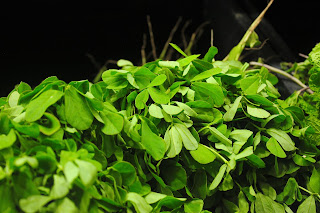Fenugreek leaves, also known as Methi, are an amazing addition to any diet. Especially during pregnancy, these leaves are a powerhouse of nutrition when eaten in moderation and can provide a range of health benefits. From lowering cholesterol levels to helping with digestion, fenugreek is packed with nutrients and has been used for centuries in food and Ayurvedic medicine. In this blog post, we'll explore the many benefits of adding fenugreek leaves to your diet during pregnancy and how it can help you have a healthy baby.
What is Fenugreek?
Fenugreek (Trigonella foenum-graecum) is an annual herb of the family Fabaceae with maple-shaped leaves native to the Mediterranean region and India. It is grown in many parts of the world to use as flavouring and herbal medicine.
It grows to a maximum height of around 30–50 cm (12–20 in), and has delicate branching stems. The leaves are trifoliolate with three small obovate to oblong leaflets. The flowers are white, axillary, and are usually borne in clusters. They smell strongly of curry when mature. The fruit is an oblong pod that is rock-hard when ripe and contains between 10 and 20 seeds.
The exterior of fenugreek seeds consist of a hard shell, which partially seeps into the interior in the form of a mucilaginous mass. When left in water, they swell and form a gel. Fenugreek seeds are also used as a spice as well as a herb. In India, fenugreek seeds are roasted and ground into a powder, dhalicha or dhana jeera powder, used in curries and other items. Dhana jeera is said to aid in digestion. In Ethiopia, the seeds are used to make berbere spice mixture, a staple in the making of wat (stew).
In Pakistan, fenugreek seeds are overnight and then into a paste that is used.
What are the benefits of Fenugreek?
For those wondering, here are just some for pregnant women and new mothers. There are many benefits of fenugreek. It relaxes milk ducts, meaning there is no pain. The herb provokes hormones related to lactation such as prolactin. Mothers who experience nipple pain, or those who have concaved nipples, are less likely to have painful breastfeeding experiences when they use this mother’s aid. The amount of milk produced is more effective and higher in quality than nipple creams. If you are pregnant, this recipes helps to maintain hydration even in hot weather, keep your baby and body healthy, and also promotes weight gain during the third trimester, which is natural. Some mothers lose weight while pregnant, but it is possible to stay above normal weight if you pay close attention to the ingredients you consume after consulting with your doctor.
1. Fenugreek can help relieve nausea and vomiting during pregnancy.
2. Fenugreek can help increase milk production in nursing mothers.
3. Fenugreek can help reduce the severity of morning sickness.
4. Fenugreek can help improve blood sugar control in diabetics.
5. Fenugreek can help lower cholesterol levels.
How to use Fenugreek during pregnancy?
Fenugreek leaves, known in India as methi, are often used to flavour curries and other dishes. They have a bitter taste and are an important ingredient of Indian cooking. Folk medicine uses Fenugreek leaves to treat almost every kind of health condition, including those relating to pregnancy.
Fenugreek leaves come in plenty of vitamins and minerals, such as iron, calcium, and folic acid,all of which are particularly relevant for a pregnant person, as well as fiber.
Fenugreek leaves can be eaten fresh or cooked or otherwise dried. Fresh leaves can be eaten raw, such as in a salad, or cooked like spinach. Cooked fenugreek leaves can be added to stews, soups and curries. Dried leaves can be made into tea or extracted in a capsule or tablet form.
Pregnant women should consult their health care provider before taking fenugreck supplements or eating large quantities of fenugreek leaves. For the most part, fenugreek is safe for pregnant women, but it’s always better to be safe than sorry.
What are the side effects of Fenugreek?
Fenugreek plant is a growing herb widely found in Mediterranean region. Fenugreek is an excellent ingredient in food preparation and medicinal herb. It is consumed as a food due to its edible easy to cook seeds and its leaves. The same leaves are commonly used in Indian food recipes.
Perhaps most concerning, fenugreek has a host of possible side effects, and can cause gastrointestinal upset (such as bloating and gas) and diarrhoea. Its effect in lowering blood sugar can be dangerous for people with diabetes and/or hypoglycaemia, as it can make these conditions worse. The effect on blood clotting is another safety issue, and use should be avoided by people with bleeding disorders or who are taking blood-thinners such as aspirin, warfarin (Coumadin) and others. Pregnant women and breastfeeding mothers should also exercise caution because fenugreek can stimulate uterine contractions.
Conclusion
Fenugreek leaves has so many minerals, vitamins and other nutrients which are very good during pregnancy. But it’s better to contact to your doctor before to take any new food during pregnancy. If you want to take fenugreek leaves during pregnancy, here is a recommendation for you, it’s better to consume them in little amount since consuming too many may have any negative effect on your health and baby’s health. I hope you got more knowledge about this topic on fenugreek leaves and pregnancy!



No comments: